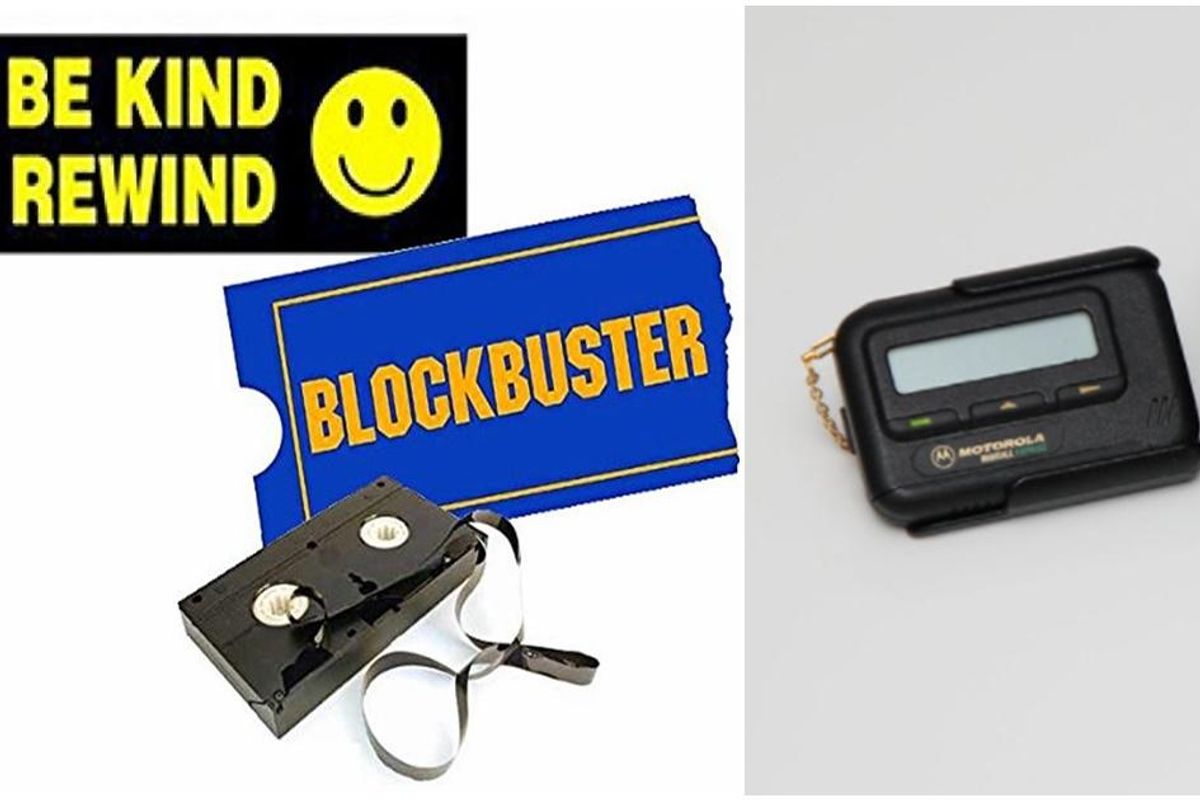17 things we all used in the year 2000 but never do today
When was the last time you used your Blockbuster card?

Blockbuster video sign and pagers.
In “Back to the Future,” teenager Marty McFly goes back in time 30 years, from 1985 to 1955. But what if the film were made today and he went back from 2021 to 1991? I think the culture shock of a modern teenager going from a post-to-pre internet world would be much greater than the one that Marty experienced in the original film.
Would a kid from today be able to dial a payphone? Read a clock with actual hands? Look up directions on a Thomas Guide map?
A lot has changed since the dawn of the new millennium so a group of Redditors marked the changes in a post entitled: “What is something that was used heavily in the year 2000, but it's almost never used today?”
Here are 17 of the best posts.
1.
"Geocities, neopets, livejournal, kazaa," — PapaWeir
GeoCities is definitely one of those things that was everywhere and then suddenly disappeared. At its peak, GeoCities hosted millions of websites, but its popularity declined after it was purchased by Yahoo and web hosting became cheaper.
2.
"If you had a big screen TV it was probably a ridiculously thick rear projection TV," — ParoxysmAttack
Before plasma TVs came around, if you had a big screen it was also a seriously deep-screen TV.
3.
"Re-writable CDs. I used to burn so many mix cds after downloading from napster, bearshare, limewire, frostwire," — Shittinwithmykitten
Napster created a music revolution overnight, but where were we going to save all of that new, stolen music? Rewriteable CDs were all the rage before the iPod came along and put 'em in the palm of your hand.
4.
"Payphones. (Yes I know payphones still exist. Also, I am now very aware payphones are free in Australia, thank you for informing me.)" — Adreeisadyno
Kids these days have never had to walk five blocks to make a phone call.
5.
"Dial-Up.
weeeeeeeee WOOOOOO_OOOOOO_
E E E E E E E EEEEEeeeeee
eee
eee URRRRRRRRRBEDULUDOLEDULUDOLEEPEEPEEP
R R R R R R R R R R R R RUMMMMMMMMMMMM," — Martini_Man_
Those of us who lived in the dial-up era will never, ever forget the whizzing, belching sound that we had to sit through to experience the World Wide Web.
7.
"Indoor smoking. My young-ish kids marvel at the fact that people used to sit in restaurants and smoke," — TurdFergDSF
People used to smoke on airplanes, in hospitals, at restaurants ... pretty much everywhere.
8.
"Blockbuster card," — larrythetarry
It wasn't Friday night in the '90s without a two-liter of Pepsi, a large pizza and a stack of VHS tapes from Blockbuster video.
9.
"VCRs," — Murtamatt
Want to feel old? In 2016, Funai, which manufacturers the VCRs in China for Sanyo, announced it would produce its final VHS player, making it the last one ever produced.
10.
"AOL," — PacMan8112
"Welcome!" "You've got mail!" AOL was the leading internet provider in the late '90s but soon lost its relevance after merging with Time Warner, Inc. in 2000.
11.
"Calculators; teachers kept saying 'you won’t have one with you all the time,' look who’s stupid now?! Both of us…" — elika007
A calculator was a luxury item in the '80s. In the '90s, a Texas Instruments graphing calculator could cost you $90. Now, it's all on your phone along with a million other apps.
12.
"A/S/L" — Smart_North_3374
Anyone who's a proud member of Gen X knows the "age/sex/location" question. It's the first thing you asked in an AOL chatroom when people used to try to hook up online. Of course, nobody answered it honestly, but that was half the fun.
13.
"JNCO jeans," — ccherry124
In the 2000s everyone wore skinny jeans. But in the 1990s, people wore the baggiest jeans possible. The award for baggiest jeans goes to JNCO, the manufacturers of raver pants that fit two legs and a few kilos worth of MDMA.
14.
"Pagers," — skaote
The pager was one of the most popular status symbols of the '90s. Nothing said "cool" like having a pager that was constantly blowing up. (Does anyone under the age of 40 know what it means for a pager to "blow up"?)
15.
"'Wanna Cyber?'" God . We were awful," — icanbeafrick
Back in the AOL days, the closest you could come to getting it on while online was through cyber sex. There were no pictures or video so you just exchanged dirty messages until the other person logged off. The typical cyber session began with, "What are you wearing?"
16.
"Limp Bizkit," — Timmah_1984
Unfortunately, they're back.
17.
"Travel agencies. Now I can do everything on my phone," — whatdoineedaname4
If you can belive it, before there was Priceline, there was a person sitting at a desk with a rotary phone who booked your seven-day trip to Europe.
This article originally appeared on 12.28.21
- These comic characters could change the way kids view ... ›
- Here are 17 things people really miss the most about living in the '90s ›
- People in the '90s and early 2000s trying to explain the internet is ... ›
- People share long forgotten internet trends on Reddit - Upworthy ›
- 17 life lessons that are learned the hard way - Upworthy ›
- 17 life lessons that are learned the hard way - Upworthy ›
- Philadelphia is reinstalling pay phones free for the public - Upworthy ›
- Millennials get nostalgic after AOL dial-up is discontinued - Upworthy ›



 A woman reading a book.via
A woman reading a book.via A woman tending to her garden.via
A woman tending to her garden.via
 A person on Threads makes a typo.Photo credit: Threads/@maureenmzobe
A person on Threads makes a typo.Photo credit: Threads/@maureenmzobe
 Cats can be finicky about how they're held.
Cats can be finicky about how they're held.  Squish that cat.
Squish that cat. 

 Young man holds up his hand to show five.
Young man holds up his hand to show five. Two women having a conversation at a coffee shop.
Two women having a conversation at a coffee shop.  Two women talking as the leave a yoga class
Two women talking as the leave a yoga class